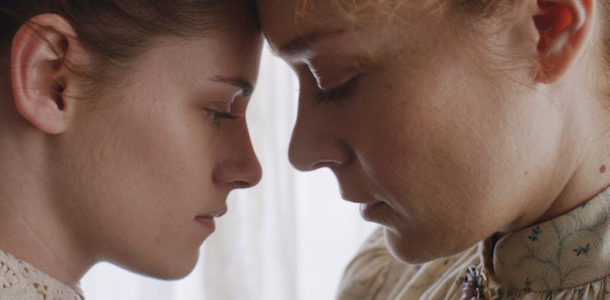
ReelBob: ‘Lizzie’ ★★½
By Bob Bloom
The crime of Lizzie Borden has become the stuff of folklore, inspiring poems, books and movies.
This newest version of the tale adds a psychosexual, feminist component to the oft-told story.
Produced by and starring Chloe Sevigny as Lizzie, from a script by Bryce Kess, the movie details the events leading up to the infamous killings of Lizzie’s stepmother and father, offering glimpses into their lives that, while not condoning the crimes, at least try to explain them.
The story is abetted by the direction of Craig William Macneill (“The Boy”), who places Lizzie in a claustrophobic environment that amplifies her defiance and frustration at — not only her parents — but society’s restrictions and treatment of women.
The movie, set in 1892 New England, is ripe with quiet tension. Throughout, Lizzie appears stifled not only by the norms of her era, but — thanks to costume designer Natalie O’Brien — by clothing that keeps Sevigny’s Lizzie covered from neck to toe and symbolically constrains her and keeps her in her place.
An aura of soft insolence hovers over the movie as Lizzie continually thwarts her father’s expectations of her place in the town’s social structure by doing what she pleases and not what he or society expects of her.
Further complicating the situation is the growing attraction between Lizzie and the family’s new housemaid, Bridget Sullivan (Kristen Stewart). A palatable aroma of sexual attraction can be whiffed at their first encounters, and they grow as the movie continues.
It is most notable after Lizzie has one of her epileptic seizures, and, after she recovers, Bridget helps to partially undress her.
Their magnetism is noticed by Lizzie’s strait-laced but hypocritical father, Andrew Borden (Jamey Sheridan), who uses his position as the family patriarch to take advantage of Bridget’s subservient position in the household.
As he sexually molests Bridget, Andrew mentally molests his daughter, threatening to have her institutionalized if she does not bend to his dictates.
Macneill sets most of the movie within the Borden house and small barn, where Lizzie routinely flees to for solitude. He envelops the entire film in a dysfunctional cocoon of oppression, resentment and sexual frustration.
The main drawback is that Macneill holds an even keel, even during the sequences in which — spoiler alert! — he shows Lizzie wielding that deadly ax.
Throughout the film, Sevigny maintains her cool, even as she is arrested, charged with the killings and held for trial. Her performance is restrained, but like that of a caged, wild animal.
Stewart’s accomplishment is displaying a bit more emotion, within the boundaries set by the director. Her Bridget is Lizzie’s partner in crime but cannot take the final step to be an accomplice.
While remaining silent and not betraying Lizzie, she does show remorse for her part, which creates a chasm between the two young women that never can be mended.
“Lizzie” is a fine movie that, at times, may seem dull. It’s not, however; the methodical pace creates that illusion.
“Lizzie” is simply too somber. It needs a few moments of high drama to grab you. Instead, it takes you gently by the hand and leads you through this lurid slice of Americana.
I am a member of the Indiana Film Journalists Association. My reviews appear at ReelBob (reelbob.com) and Rottentomatoes (www.rottentomatoes.com). I also review Blu-rays and DVDs. I can be reached by email at bobbloomjc@gmail.com or on Twitter @ReelBobBloom. Links to my reviews can be found on Facebook, Twitter, Google+ and LinkedIn.
LIZZIE
2½ stars out of 4
(R), graphic violence, grisly images, nudity, sexual content